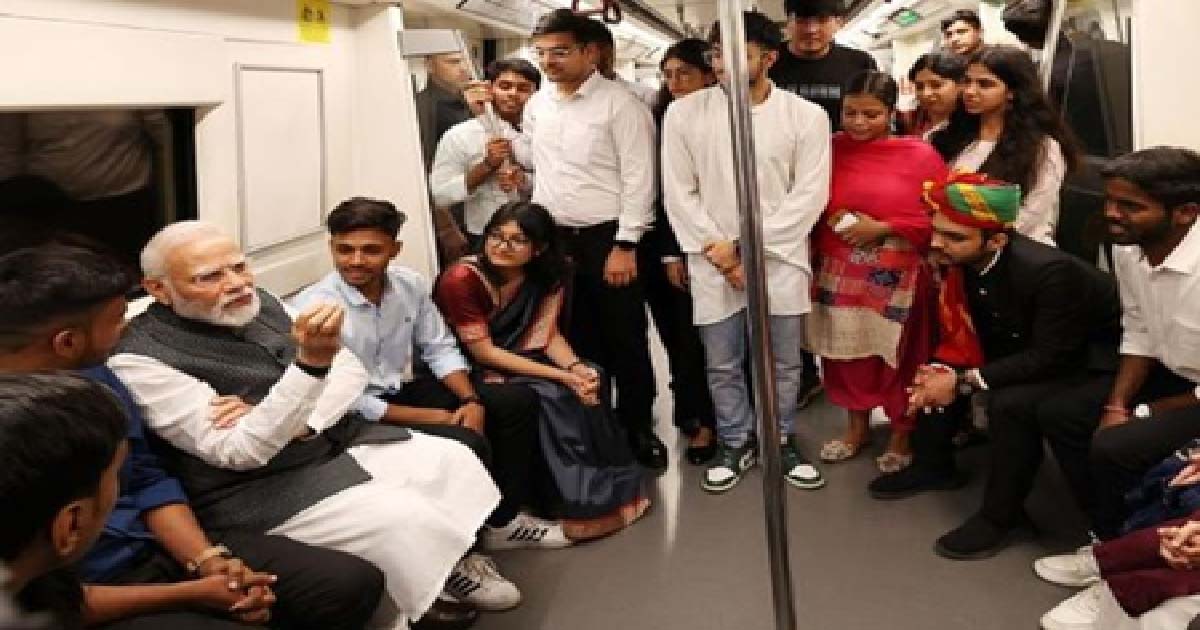Business
US has reached a ‘substantial framework’ with China to avert tariffs: US Treasury Secretary Bessent

Washinton, Oct 27: US Treasury Secretary Scott Bessent has said that he believes the US has reached a framework agreement with China to avoid imposing an additional 100 per cent tariff on Chinese imports.
“I think we’ve reached a substantial framework for the two leaders who will meet next Thursday… that tariffs will be averted,” Bessent said on Sunday to media from Kuala Lumpur, Malaysia, where President Donald Trump arrived on Saturday for a weeklong Asia diplomacy tour.
Trump is expected to meet with Chinese leader Xi Jinping in South Korea later this week.
Earlier, Chinese International Trade Representative Li Chenggang said the US and China had reached “preliminary consensus” on trade issues during discussions in Malaysia, according to Chinese media.
Bessent did not provide details about the framework but said on media that he anticipates the US would get “some kind of deferral” on rare-earth export controls.
The minerals have been central to trade tensions between the top global economies.
Bessent said the framework sets up Trump and Xi “to have a very productive meeting,” adding, “I think it will be fantastic for US citizens, for US farmers, and for our country in general.”
Bessent indicated that an escalation in tariffs on China is “effectively off the table” following what he described as “very good” trade talks with his Chinese counterparts.
President Trump had threatened an additional 100 per cent tariff on China from November 1 over Beijing’s efforts to impose export controls on critical rare earths, ratcheting up tensions between the US and China.
Asked about the status of those tariffs, Bessent told media on Sunday that tariff threat has “gone away” after two days of talks in Malaysia.
“We had a very good two-day meeting. I would believe that the – so it would be an extra 100 per cent from where we are now, and I believe that that is effectively off the table.”
He added, “I would expect that the threat of the 100 per cent has gone away, as has the threat of the immediate imposition of the Chinese initiating a worldwide export control regime.”
US and Chinese trade negotiators reached a “basic consensus” on how to address their “respective concerns,” Chinese state media said on Sunday, following talks between the two sides over the weekend in Kuala Lumpur.
A delegation led by Chinese Vice Premier He Lifeng met with US officials including Treasury Secretary Scott Bessent and Trade Representative Jameson Greer for the talks, which come days ahead of a highly anticipated meeting between Chinese leader Xi Jinping and US President Donald Trump.
The two leaders are expected to meet on the sidelines of the APEC summit in South Korea, though Beijing, unlike Washington, has yet to confirm the meeting.
Earlier on Sunday, Bessent said the two sides had “set the stage for the leaders’ meeting” with a “very successful framework for the leaders to discuss”.
“The two sides engaged in candid, in-depth, and constructive exchanges and consultations on major economic and trade issues of mutual concern,” the Chinese state media readout said.
It listed out those issues as including US penalties on China’s maritime logistics and shipbuilding industry, reciprocal tariffs, fentanyl tariffs, agricultural trade, and export controls – a sweeping set of frictions that have set the world’s two largest economies at loggerheads.
“Two sides reached a basic consensus on arrangements to address each other’s concerns. Both sides agreed to further finalise the specific details and fulfil their respective domestic approval processes,” the readout said.
Trade and tech tensions between the world’s two biggest economies have heightened in recent weeks after the US expanded its export blacklist, hitting China’s access to American high-tech, while China ramped up its own export controls on rare earth minerals.
Business
Job postings in India stay above pre-Covid pandemic levels: Report

New Delhi, Nov 27: Formal job creation in India softened in the month of October but despite this, job postings remained above the pre-Covid pandemic level, a report said on Thursday.
“Amid slowdown, Indian job postings are still 60 per cent above pre-pandemic levels, but have fallen 25 per cent since their peak in January 2023,” Indeed, a leading hiring platform, said in its report.
Over the past three months, job postings declined in almost three-quarters of occupations. Yet in a softening job market, there will still be some strong performers, and the past three months have been no exception, said the report.
Job postings in cleaning and sanitation rose around 20 per cent over the past three months, ahead of community and social service (17.4 per cent), dental (13.1 per cent), nursing (11.2 per cent) and food preparation and service (10.3 per cent).
Another positive was the posting for human resources, which climbed 2.3 per cent.
However, these gains were more than offset by weakness in banking and finance, where postings fell 25.6 per cent, along with legal (-22.4 per cent), retail (-16.7 per cent) and loading and stocking (-15 per cent), the report noted.
Every month, the Indian workforce gradually transitions towards more formal work arrangements. As the nation transitions, job creation in the formal sector is expected to outpace overall employment growth nationwide, said Callam Pickering, Indeed’s APAC Senior Economist.
“This transition is also why job postings in India have been stronger than in other Indeed markets, both during the post-pandemic job boom and the subsequent slowdown,” he added.
Meanwhile, during the month, 9.1 per cent of Indian job postings explicitly mentioned phrases such as ‘work from home’ or ‘work remotely’ in their job descriptions. That’s up from 7.6 per cent a year ago.
Remote opportunities are most common in IT infrastructure, operations and support at 18.2 per cent of postings in the October quarter 2025, ahead of community & social service (15.1 per cent) and industrial engineering (14 per cent).
Business
From Kachchhi Kharek to Kesar Mango: Over 10 treasures of Kutch and Saurashtra earn GI tag

Gandhinagar, Nov 27: Prime Minister Narendra Modi has consistently championed India’s indigenous and heritage products, placing local strength at the heart of national growth. His call for Vocal for Local and Aatmanirbhar Bharat has given visibility to artisans and farmers across the country.
In line with this vision, the Prime Minister has also actively promoted Geographical Indication (GI) products, highlighting them in his radio address Mann Ki Baat and personally felicitating artisans who preserve traditional crafts.
Union Commerce and Industry Minister Piyush Goyal has set an ambitious goal of reaching 10,000 GI-tagged products across India by 2030 under the vision of “Vikas Bhi, Virasat Bhi.”
Gujarat has emerged as a strong contributor to this national mission by promoting its rich artisanal heritage, from Kutch’s celebrated crafts to Saurashtra’s premium agricultural produce on global platforms.
GI tagging reinforces the state’s commitment to “Viksit Gujarat to Viksit Bharat,” transforming local skills into global competitiveness. Kutch and Saurashtra together have secured GI recognition for over ten iconic products, including Ajrakh block printing, Bandhani tie-dye, Rogan art, Kutch shawls, the famed Kachchhi Kharek, and the globally loved Gir Kesar mango.
The upcoming Vibrant Gujarat Regional Conference (VGRC) in Rajkot will spotlight the region’s craft excellence and export capacity, offering artisans a robust platform to scale their businesses.
Renowned for its blend of tradition and artistry, Kutch boasts GI-tagged crafts such as embroidery, Ajrakh printing, Bandhani, Rogan painting and the Kutch shawl. In the agricultural category, Kachchhi Kharek — a celebrated variety of date known for its rich flavour and nutritional value has also earned GI status.
Saurashtra’s signature products include Gir Kesar mango, often hailed as the “Queen of Mangoes,” the famed Jamnagari Bandhani, and the exquisite Rajkot Patola silk weaving tradition, cherished by Bollywood celebrities.
Surendranagar’s Tangaliya shawl, with its intricate weaving technique, has also built a loyal international following. The upcoming VGRC for Saurashtra and Kutch aims to accelerate the region’s artisan economy.
The two-day conference will bring together entrepreneurs, artisans, interior designers and product designers, creating avenues of collaboration with the Government e-Marketplace, private enterprises, investors and leading e-commerce platforms. The event promises to enhance innovation, expand market access and drive sustainable growth for traditional craft clusters.
Business
Young innovators worldwide can find inspiration from confidence of India’s Gen Z: PM Modi

New Delhi, Nov 27: Prime Minister Narendra Modi on Thursday lauded India’s Generation Z for their confidence and capacity building.
Speaking via video conferencing at the inauguration of the Infinity Campus of Indian space startup Skyroot and unveiling its first orbital rocket, Vikram-I, PM Modi praised the country’s Gen Z for their positive mindset and creativity.
“Our youth, our Gen Z, are developing solutions to challenges in every sector. Young innovators around the world can find inspiration from the confidence of India’s Gen Z,” PM Modi said.
“The capacity building, positive mindset, and creativity of India’s Gen Z can set a global benchmark for Gen Z across the world,” he said.
Emphasising that India’s youth always place national interest above all and make the best use of every opportunity, PM Modi remarked that when the government opened the space sector, the country’s youth, especially the Gen-Z generation, came forward to take full advantage of it.
He highlighted that today more than 300 space startups are giving new hope to India’s space future, and noted that most of these startups began with small teams — sometimes two people, sometimes five, sometimes in a small rented room — with limited resources but with determination to reach new heights.
“This spirit has given birth to the private space revolution in India,” said the Prime Minister. He noted that Gen-Z engineers, designers, coders, and scientists are creating new technologies, whether in propulsion systems, composite materials, rocket stages, or satellite platforms.
PM Modi stressed that India’s youth are working in areas that were unimaginable just a few years ago.
He remarked that India’s private space talent is establishing a distinct identity across the world and added that today, for global investors, India’s space sector is becoming an attractive destination.
The Prime Minister remarked that the changes being witnessed in the space sector are part of the broader startup revolution taking place in India.
“Over the past decade, a new wave of startups has emerged across diverse sectors such as fintech, agri tech, health tech, climate tech, edu tech, and defense tech, with India’s youth, particularly the Gen-Z generation, providing innovative solutions in every field,” PM Modi said.
PM Modi emphasised that “India has now become the world’s third-largest startup ecosystem”.
There was a time when startups were confined to a few big cities, but today they are emerging from small towns and villages as well, the Prime Minister said, underlining that the country now has more than 1.5 lakh registered startups, with many of them having achieved unicorn status.
“India is no longer confined to apps and services but is now advancing rapidly towards deep-tech, manufacturing, and hardware innovation,” said the Prime Minister, thanking Gen-Z.
-

 Crime3 years ago
Crime3 years agoClass 10 student jumps to death in Jaipur
-

 Maharashtra1 year ago
Maharashtra1 year agoMumbai Local Train Update: Central Railway’s New Timetable Comes Into Effect; Check Full List Of Revised Timings & Stations
-

 Maharashtra1 year ago
Maharashtra1 year agoMumbai To Go Toll-Free Tonight! Maharashtra Govt Announces Complete Toll Waiver For Light Motor Vehicles At All 5 Entry Points Of City
-

 Maharashtra1 year ago
Maharashtra1 year agoFalse photo of Imtiaz Jaleel’s rally, exposing the fooling conspiracy
-

 National News1 year ago
National News1 year agoMinistry of Railways rolls out Special Drive 4.0 with focus on digitisation, cleanliness, inclusiveness and grievance redressal
-

 Maharashtra1 year ago
Maharashtra1 year agoMaharashtra Elections 2024: Mumbai Metro & BEST Services Extended Till Midnight On Voting Day
-

 National News1 year ago
National News1 year agoJ&K: 4 Jawans Killed, 28 Injured After Bus Carrying BSF Personnel For Poll Duty Falls Into Gorge In Budgam; Terrifying Visuals Surface
-

 Crime1 year ago
Crime1 year agoBaba Siddique Murder: Mumbai Police Unable To Get Lawrence Bishnoi Custody Due To Home Ministry Order, Says Report












